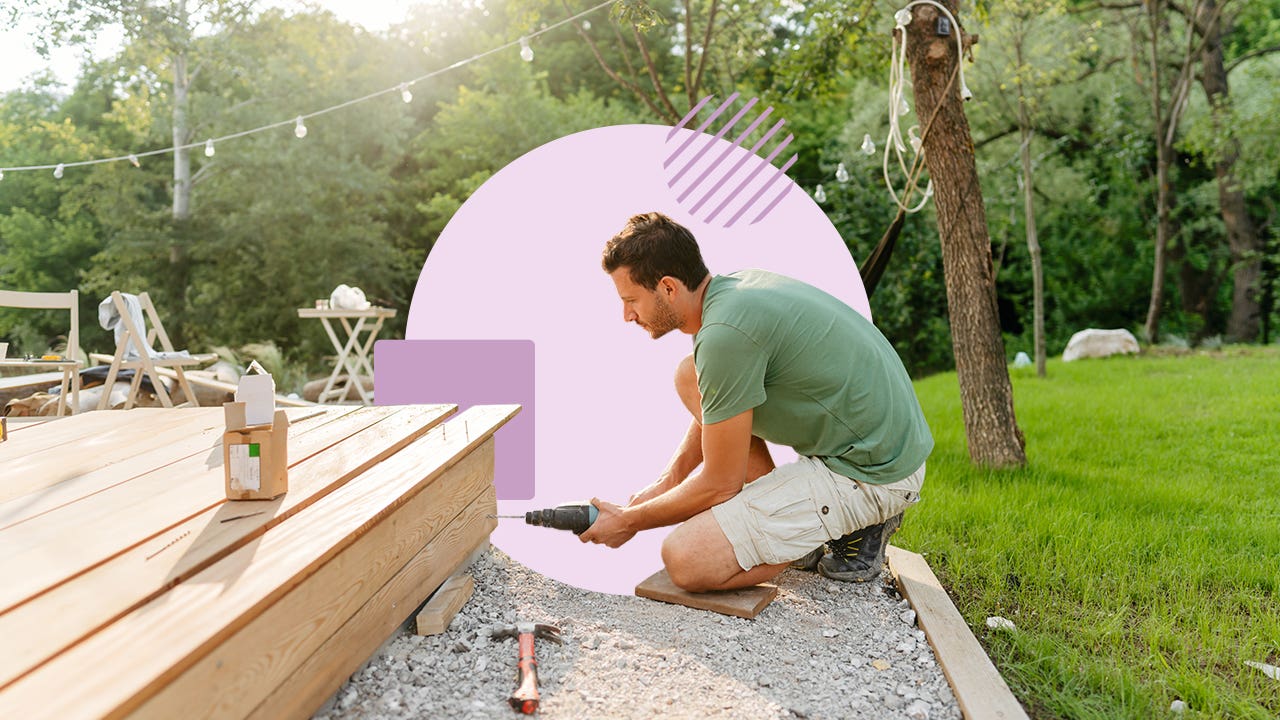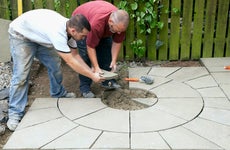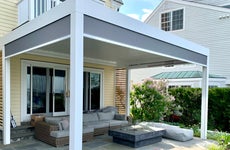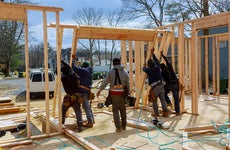How much does it cost to build a deck?

The Bankrate promise
At Bankrate we strive to help you make smarter financial decisions. While we adhere to strict , this post may contain references to products from our partners. Here's an explanation for .
Two pandemic-induced years of being house-bound has given many people a deeper appreciation of the outdoors — and of using the outdoors to extend their homes.
The backyard deck is a perennially popular project: It was the most frequently added exterior structure in 2022, according to the 2023 Houzz & Home study. Some 15 percent of homeowners installed or upgraded one in the past year.
If this is inspiring you to revamp your backyard space, you’ll naturally wonder: How much does a deck construction cost?
According to HomeAdvisor, homeowners typically spend between $4,160 and $11,876 to build a deck, with the average cost right around $8,003. But a variety of factors influence that figure, ranging from basic materials to labor costs to features and furnishings. Let’s break down the costs to build a deck, and how to save on those costs.
Key takeaways
- The average cost to build a deck is around $8,000, or $30-60 per sq. fit.
- Deck costs vary depending on multiple factors, including the size, style and materials used.
- You can reduce the costs by installing the deck yourself or choosing less-expensive decking materials.
How much does it cost to build a deck?
Not all decks are created equal. Plenty of elements impact the construction price:
- Size
- Design complexity (different levels, shape)
- Material
- Self-installed or professionally installed
The bigger you want your deck to be, the bigger you should make your budget. The average deck cost per square foot is around $30 to $60, including labor and materials, according to HomeAdvisor. If you hire a professional installer or choose high-end materials, your costs may be on the pricier end of this range. But if you decide to DIY or opt for cheaper wood, you’ll pay less.
Decking materials
What your deck is made out of plays a major role in how much your deck will cost. In fact, materials can make up half the total project expense, though 30 percent is more common.
TYPICAL DECK MATERIALS AND THEIR PRICES |
|
|---|---|
| Material | Cost range per square foot |
| Source: HomeAdvisor | |
| Fiberglass and composite (including vinyl and PVC) | $12-$22 |
| Trex (composite of recycled materials) | $5-10 |
| Pressure-treated wood | $2-5 |
| Ipe | $10-20 |
| Aluminum | $15-$20 |
| Redwood | $5-$35 (depends on grade) |
| Tigerwood | $7-$15 |
| Cedar | $3-$7 |
| Bamboo | $3-$10 |
| Cement | $30-$75 |
Of course, the boards aren’t the only materials. You’ll need to factor in framing, piling and the other components that will keep your deck off the ground.
Deck style
Your deck style is an important consideration when you’re calculating how much it will cost to build. Here’s how some of the most popular styles compare in terms of cost.
Platform deck
Platform decks, single-level structures located at or just above ground level, are the least expensive to install since they don’t require extra features like stairs and railings. According to HomeAdvisor, you’ll pay between $10 and $20 per square foot to add one to your home. (Yes, they’re similar to patios. The main distinction is that a deck is a slightly elevated, beamed platform attached to a house, while a patio is a paved or concrete space set into the ground.)
Raised deck
The most familiar variety, raised or second-story decks are more highly elevated (sometimes they’re attached to the home’s second floor), so they need pillars and foundations, along with steps and railings. As a result, they’re more expensive than platform decks, ranging from $40 to $50 per square foot.
Multi-level deck
Spanning two or even three stories, multi-level decks require more support and time to construct, which is why they cost about three times as much as their ground-floor counterparts. To build one of these decks, you should expect to pay between $30 and $75 per square foot.
Deck size
Decks vary quite a bit in size, but the larger they are, the more expensive they’ll be to construct. Below, you can see approximately how much you’ll pay for your deck based on its size, according to HomeAdvisor.
| Deck size | Typical price range |
|---|---|
| Source: HomeAdvisor | |
| 10×10 (100 square feet) | $4,000-$6,000 |
| 12×12 (144 square feet) | $5,760-$8,640 |
| 14×20 (280 square feet) | $11,200-$16,800 |
| 16×20 (320 square feet) | $12,800-$19,200 |
| 20×20 (400 square feet) | $16,000-$24,000 |
Deck features
Many people want their deck to function as an additional room. Keep in mind, though, that the more features, the more it will increase your total deck construction costs.
Stairs and steps are often a necessary fixture, especially if you are building a multi-level deck. These can run between $210 and $290, according to HomeGuide. Railings are another important safety feature, which runs about $20 per linear foot.
Lighting is a worthwhile addition, both for safety and ambience. Deck lights can run from $8 to $30 each, according to HomeAdvisor. Post lighting can cost considerably more, from $30 to more than $100 per piece.
If privacy is important, screens can cost around $20 per panel, based on reported HomeGuide data. A screened-in deck can also be customized, which can run between $600 and $3,500.
If you want to enjoy your deck even on cold nights, a heater is a must. Prices vary — a high-quality post heater or wall-mounted heater is $100 to $300, HomeAdvisor reports. At the other end of the scale, a deck that gets too warm could benefit from a misting system, which can run between $2,100 and $3,400.
You’ll also need a place to kick back and enjoy the view from your new deck, so be sure to include furniture prices in your expense forecast. If you’re looking for a living room-style setup with chairs, a couch and tables, you might need to shell out $4,000, HomeAdvisor’s data shows. To save on this expense, look for seasonal deals on outdoor furniture to take advantage of retailers looking to move last year’s inventory.
Deck labor costs
If you decide to hire pros to build your deck, be advised that labor costs a lot — at least half, and often around at 70 percent, of the overall project cost. HomeAdvisor gives a range of $15 to $32 per square foot to construct the deck itself, with foundation installation running $25–300 per post. The presence of multiple levels, staircases, and a wraparound or asymmetrical shape all make the workers’ time mount. Also expect to pay more if they’re dealing with hard-to-work-with materials, like tigerwood.
Deck building permit
As with any major renovation, you might need a permit for the work. Every jurisdiction has its own requirements, and it’s important to know what they are before commencing with your deck project. HomeAdvisor pegs the permit for building a new deck somewhere between $225 and $500.
Other/ongoing deck costs
Once the deck construction is complete, there are other, ongoing deck costs homeowners will have to factor into the total cost.
Taxes and insurance
Like any home remodel that expands living space, a new deck has the potential to increase the value of your property, which is good news for anyone thinking in terms of investment and resale value. However, that increase in value can also mean an increase in property taxes. Once you know what kind of deck you want, check with your local tax assessor to factor in an estimate of the increase, which you can then account for in the overall cost to build a deck.
Be sure to call your homeowners insurance provider, too. In most policies, decks fall under other structures coverage, which may need to be increased to protect your new home addition.
Deck maintenance
Wooden decks require regular maintenance. Deck stain, which HomeAdvisor estimates costs $30 per gallon if you do it yourself, fades over time, so you might need to refresh it annually. If you want to hire someone else to handle the work, expect to pay between $550 and $1,050.
Combination products for sealing and waterproofing a deck, meanwhile, cost $30 to $40 per gallon.
Remember that decks can get dirty, too. Whether you want to do a deep-clean or need to reseal or stain, expect to pay between $200 and $400 to pressure-wash yours.
Keep in mind that skimping on these maintenance steps might save you some money in the short term, but could cost a lot more in the long run if it becomes necessary to replace a damaged deck.
How to keep deck construction costs down
Looking for ways to lower the bill for a new deck? Consider these tips as you envision your new outdoor oasis:
- Keep it simple. It might be nice to add a roof for some extra shade or design a deck that wraps around your house, but those enhancements will increase the cost of your project. The fewer angles, stairs and materials you require, the fewer dollars you’ll need to spend.
- Think long-term. If you’re planning to stay in your home for a long time, consider the big picture when picking your materials. For example, cedar’s upfront price tag might be one of the cheapest, but this wood can also damage easily. Tigerwood, on the other hand, has a higher per-square-foot cost, but it can last more than 25 years. Also bear in mind that metal and composite decks may be more expensive to build, but require less maintenance than wooden ones.
- Prep your yard. Before you begin building a deck, you’ll need to clear space in your yard, demolish your old deck (if you have one) and prepare the ground beneath your deck. If you’re comfortable handling these types of tasks yourself, you could save a bit of cash on contractors’ wages. After the deck’s done, you could also DIY debris disposal (if your pro charges extra for that.)
Should you DIY or hire a professional when building a deck?
Speaking of contractors, you could skip that step, too, which can create big savings (given that labor costs can run 70 percent of the project). You’ll need to weigh the pros and cons of dedicating a chunk of your free time versus paying someone else for their time, however — and you’ll need to feel supremely confident in your construction skills.
“It’s true that DIY can save money and provide a sense of satisfaction, but it’s important to consider your skill level and the complexity of the project,” says Joel Comino, founder and CEO of Next Modular, a home-building company based in Goshen, Indiana. “Building a deck requires knowledge of carpentry, construction, and safety procedures. If you aren’t confident in your skills, it’s better to hire a professional who can ensure that the deck is built correctly and safely.”
Does building a deck add value to your home?
While many homeowners decide to install a deck because it enhances their at-home experience, taking on this project can also have a positive financial outcome. In fact, you may be able to recover at least half of the deck’s cost in the form of added value to your property.
Just be aware that the increase in value might not be as much as you invested in the project, says Mike Reedy, owner of Quality Built Exteriors, a roofing and deck-building company in Chesapeake, Virginia.
“It may not be 100 percent of what you put into it, but it does typically increase,” he says. “The value added can be in the form of equity and resale value, and it can also be in the improved appearance and enjoyment of the space by the current or new homeowner.”
The bottom line on building a deck
A new deck can increase your living space and transform your outdoors into a fun and functional place for relaxing and entertaining.
When considering how much it costs to build a deck, it’s important to understand that expenses vary based on materials, size of the deck and any additions you want.
Work out your specific requirements first, and then shop around for competitive quotes. Home builders and contractors are busier than ever, so you’ll want to have an idea of who is available early on and how much they can help you save on materials. Contractors might be able to find better pricing than off-the-shelf at major home renovation stores, for instance.
Also, be sure to check with local authorities to get any necessary permits, which can increase the overall cost of the project, and remember to factor in additional costs such as property taxes and homeowners insurance into your budget.
Related Articles



